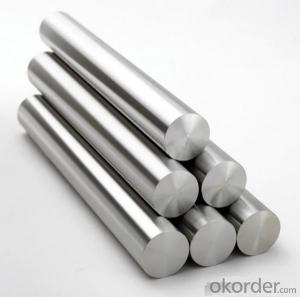Grade SUS410 Stainless Steel Round Bar with Certification
- Loading Port:
- Shanghai
- Payment Terms:
- TT OR LC
- Min Order Qty:
- 3 m.t.
- Supply Capability:
- 100000 m.t./month
OKorder Service Pledge
OKorder Financial Service
You Might Also Like
Item specifice
Grade SUS410 Stainless Steel Round Bar with Certification
Details Information of Grade SUS410 Stainless Steel Round Bar with Certification
| Name | SUS410 Stainless Steel |
| Shape | Round Bar/Square Bar/Flat Bar/Plate/Wire |
| Standard | GB/ASTM/SAE/AISI/DIN/JIS/EN/BS |
| Surface Treatment: | Black/Peeling/Polished/Machined |
| Delivery Condition: | Hot Rolled or Forged/Peeled or Black Surface |
| Test | SGS/UT 100% Elements Testing |
| Certificate: | ISO/Mill Certificate |
| Service: | 24 hours online service / |
| more than 20 years trading and manufacture | |
| Quality Assurance: | the third party inspection, such as SGS, BV, TUV…etc. is acceptable |
| Packaging Details: | Seaworthy Packaging or as per customer's packing instruction |
| Carbon structure round bar | Q195 Q235A Q235B 10# 20#-55# S45CB |
| Low alloy high strength round bar | Q345A/Q345C/Q345D Q345B Q345E |
| Alloy structure round bar | SAE51B20 20Cr 40Cr 40CrV 20CrMo/30CrMo/35CrMo/42CrMo 20CrMoA/30CrMoA/35CrMoA/42CrMoA/42Cr ML20CrMo/ML30CrMo/ML35CrMo/ML42CrMo B7/SCM435-440 20MnTiB 20CrMnMo 20CrMoH 42CrMoH 40MnB/40MnBH 30Mn2-40Mn2 27SiMn 50CrVA 30CrMnTi |
| Pinion steel | 20CrMnTi 20CrMnTiH 20CrMnTiHCS/20CrMnTiHLD Q20CrMnTi-1/Q20CrMnTi-2 |
| Sucker rod | 20-35CrMoA |
| Free-cutting steel | GT1215S |
| Spring steel | 60Si2MnA 65Mn |
| Ball bearing steel | GCr15 |
Chemical Composition of Grade SUS410 Stainless Steel Round Bar with Certification
| C | Si | Mn | P | S | Cr | Ni | Cu |
| 0.17-0.24 | 0.17-0.37 | 0.35-0.65 | ≤0.035 | ≤0.035 | ≤0.25 | ≤0.25 | ≤0.25 |
| Tensile strength (σb/MPa) | Yield strength (σb/MPa) | Elongation (δ5/%) |
| ≥410(42) | ≥245(25) | ≥25 |
Company Introduction of Grade SUS410 Stainless Steel Round Bar with Certification
CNBM International Corporation is the most import and export platform of CNBM group(China National Building Material Group Corporation) ,which is a state-owned enterprise, ranked in 270th of Fortune Global 500 in 2015.
With its advantages, CNBM International are mainly concentrate on Cement, Glass, Iron and Steel, Ceramics industries and devotes herself for supplying high quality series of refractories as well as technical consultancies and logistics solution.
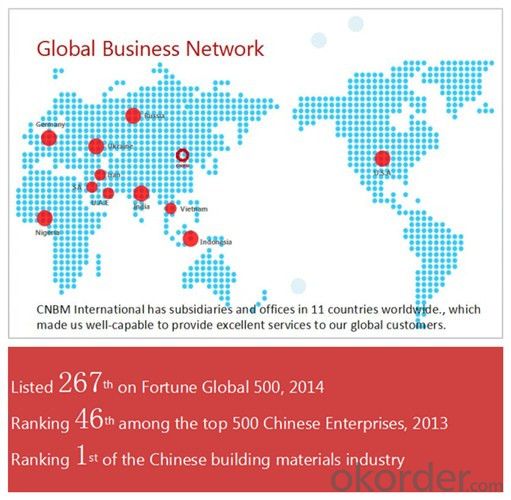
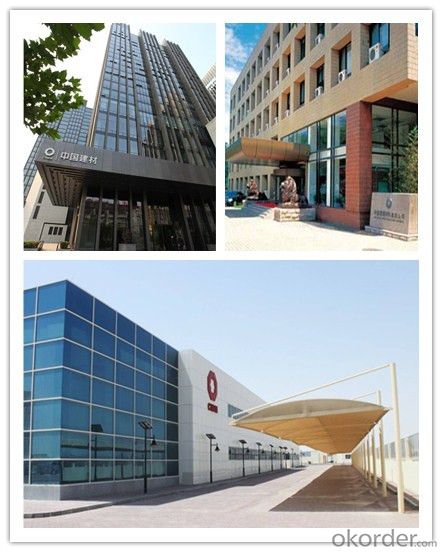
Certificates of Grade SUS410 Stainless Steel Round Bar with Certification
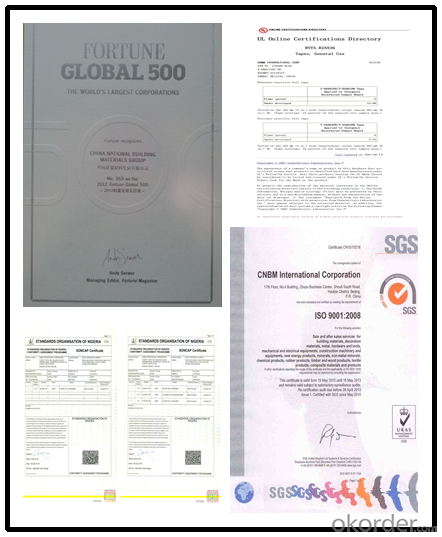
Packaging & Delivery of Grade SUS410 Stainless Steel Round Bar with Certification
Packaging Detail | Sea worthy packing /as per customer's packing instruction |
Delivery Detail | 15 ~ 40 days after receiving the deposit |
Products show of Grade SUS410 Stainless Steel Round Bar with Certification
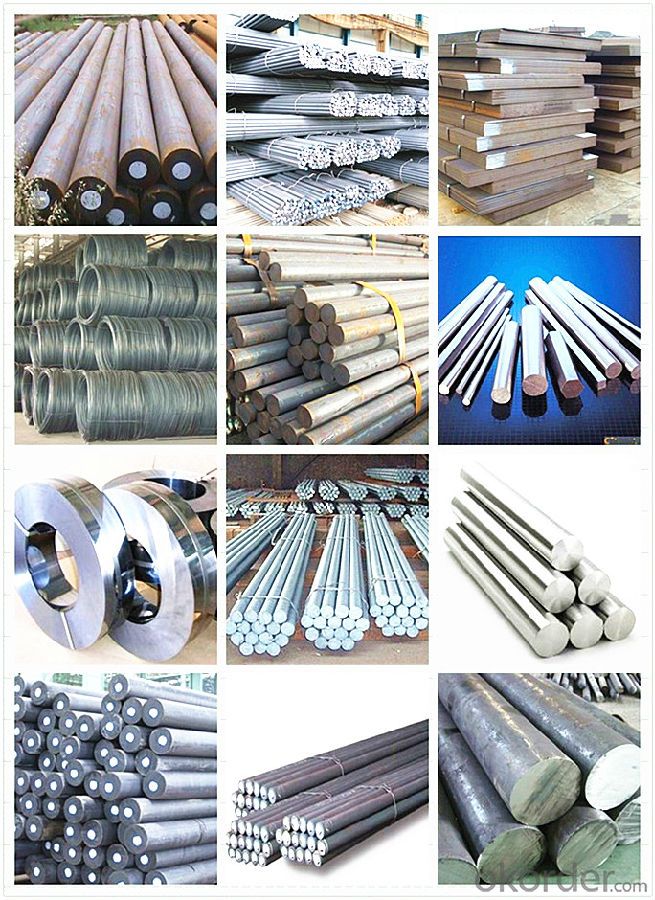
FAQ
Are you a trading company or manufacturer? | Manufacturer |
What’s the MOQ? | 3 metric ton |
What’s your delivery time? | 15-35 days after downpayment received |
Do you Accept OEM service? | Yes |
what’s your delivery terms? | FOB/CFR/CIF |
What's the Payment Terms? | 30% as deposit,70% before shipment by T/T |
Western Union acceptable for small amount. | |
L/C acceptable for large amount. | |
Scrow ,Paybal,Alipay are also ok | |
Why choose us? | Chose happens because of quality, then price, We can give you both. Additionally, we can also offer professional products inquiry, products knowledge train (for agents), smooth goods delivery, excellent customer solution proposals. |
What's your available port of Shipment? | Main Port, China |
What’s your featured services? | Our service formula: good quality+ good price+ good service=customer's trust
|
Where are your Market? | Covering more than 160 countries in the world |
- Q:How is special steel used in the railway supply chain?
- Special steel is used in the railway supply chain for various applications such as manufacturing railway tracks, wheels, axles, and components. It offers superior strength, durability, and resistance to wear and tear, ensuring safe and efficient transportation. Special steel's unique properties make it an essential material in constructing reliable and high-performance railway infrastructure.
- Q:How does special steel perform in high-speed applications?
- Special steel performs exceptionally well in high-speed applications. Its unique composition and properties, such as high strength, hardness, and toughness, allow it to withstand extreme conditions, including high temperatures, vibrations, and stresses. This ensures reliable performance, minimal wear, and extended service life, making special steel an ideal choice for high-speed applications where precision, durability, and efficiency are critical.
- Q:What are the main characteristics of high-speed steel forgings?
- Highly desirable in various industries are high-speed steel forgings, which possess several key characteristics. To begin, the exceptional hardness and wear resistance of high-speed steel forgings are noteworthy. This is a result of their composition, which typically includes elements like tungsten, molybdenum, chromium, and vanadium. These elements create hard carbides within the steel matrix, leading to a material capable of enduring high temperatures and resisting abrasion and deformation. Additionally, high-speed steel forgings exhibit excellent heat resistance, enabling them to maintain their hardness and strength even at elevated temperatures. This is particularly significant in applications where tools or components undergo intense heat during operation. Another important trait of high-speed steel forgings is their ability to retain a sharp cutting edge for extended periods. This proves advantageous in cutting tools, where an efficient and precise machining process relies on a sharp edge. The steel's high hardness ensures the cutting edge remains sharp, resulting in enhanced tool life and performance. Moreover, high-speed steel forgings demonstrate good toughness and impact resistance, making them less vulnerable to cracking or chipping under heavy loads or sudden impacts. This ensures their durability and reliability in demanding applications. In addition to these mechanical properties, high-speed steel forgings possess excellent machinability. They can be easily shaped, formed, and machined into intricate geometries, making them ideal for producing complex components or tools. Overall, the main characteristics of high-speed steel forgings encompass exceptional hardness, wear resistance, heat resistance, cutting edge retention, toughness, impact resistance, and machinability. These qualities render them highly sought-after in industries such as aerospace, automotive, tooling, and machining, where performance, reliability, and longevity are of utmost importance.
- Q:What are the different types of free-cutting steel?
- There are several different types of free-cutting steel, including leaded steels, sulfurized steels, and phosphorized steels. These types of steels are specifically designed to improve machinability and enhance the cutting performance during manufacturing processes.
- Q:What is the importance of heat treatment in special steel?
- Heat treatment is of utmost importance in special steel because it significantly enhances its mechanical properties and overall performance. Special steel, also known as alloy steel, is specifically designed to possess specific characteristics such as high strength, hardness, wear resistance, and toughness, making it suitable for demanding applications in industries like automotive, aerospace, and tooling. The heat treatment process involves controlled heating and cooling of the steel to alter its microstructure, which in turn affects its properties. There are several heat treatment techniques employed, including annealing, tempering, quenching, and hardening, each serving a specific purpose. One key importance of heat treatment in special steel is the ability to increase its hardness. Through techniques like quenching and hardening, the steel can be transformed into a hardened state, where it becomes much stronger and more resistant to abrasion and wear. This is crucial for applications that involve heavy loads, impact, and abrasive environments. Additionally, heat treatment can also improve the toughness and ductility of special steel. By carefully controlling the cooling rate during the heat treatment process, the steel's microstructure can be adjusted to achieve a fine-grained structure, enhancing its toughness and ability to withstand sudden impacts or shocks. This is particularly important in applications where the material needs to absorb energy and resist fractures, such as in structural components or tools. Furthermore, heat treatment can also improve the machinability and dimensional stability of special steel. By subjecting the steel to annealing or tempering processes, internal stresses and residual strains can be relieved, resulting in a more stable and easier-to-machine material. This is crucial in industries where precision and dimensional accuracy are paramount. In conclusion, the importance of heat treatment in special steel cannot be overstated. It is a vital process that allows for the optimization of the steel's mechanical properties, ensuring it meets the specific requirements of demanding applications. By carefully manipulating the microstructure, heat treatment enhances the steel's hardness, toughness, and machinability, making it a versatile and reliable material in various industries.
- Q:What are the different methods for improving the corrosion resistance of special steel?
- There are various methods for improving the corrosion resistance of special steel. One common approach is the addition of alloying elements such as chromium, nickel, and molybdenum, which form a protective oxide layer on the steel's surface. Surface treatments like galvanizing, electroplating, or applying protective coatings can also enhance corrosion resistance. Additionally, heat treatment processes like annealing, quenching, and tempering can modify the microstructure of the steel, making it more resistant to corrosion. Regular maintenance, including proper cleaning and lubrication, is also important in preventing corrosion and preserving the steel's integrity.
- Q:What are the different shot blasting techniques used for special steel?
- Some of the different shot blasting techniques used for special steel include wheel blasting, air blasting, and tumble blasting. Wheel blasting uses a high-speed rotating wheel to propel abrasive particles at the steel surface, while air blasting involves using compressed air to propel the particles. Tumble blasting, on the other hand, involves placing the steel in a rotating drum and allowing the abrasive particles to impact the surface as the drum rotates. These techniques help to remove surface contaminants, improve surface finish, and enhance the overall quality of the special steel.
- Q:What are the properties of high-temperature steel?
- High-temperature steel possesses several key properties including excellent strength, oxidation resistance, and thermal stability. It can withstand extreme temperatures without losing its structural integrity, making it suitable for applications such as power generation, aerospace, and industrial processes. Additionally, high-temperature steel exhibits low thermal expansion and good creep resistance, ensuring dimensional stability even under prolonged exposure to high temperatures.
- Q:Can special steel be used in the wind turbine manufacturing industry?
- Yes, special steel can be used in the wind turbine manufacturing industry. Special steel, such as high-strength low-alloy (HSLA) steel or advanced high-strength steel (AHSS), is often utilized in the construction of wind turbine components due to its superior mechanical properties, including high strength, corrosion resistance, and durability. These properties make special steel an ideal material choice for wind turbine manufacturers as it helps enhance the overall performance and lifespan of the turbines.
- Q:What are the requirements for special steel used in power generation equipment manufacturing?
- The standards for manufacturing special steel used in power generation equipment are very strict. The steel must be incredibly strong and durable in order to withstand the extreme conditions and heavy loads that power generation equipment experiences. This includes the ability to handle high temperatures, pressure, and mechanical stress. In addition to these requirements, the steel used in power generation equipment must also have excellent resistance to corrosion and oxidation. Since power generation equipment often operates in challenging environments, such as high humidity or exposure to corrosive substances, the steel must be highly resistant to ensure it lasts a long time and performs well. Furthermore, the steel used in power generation equipment must be easy to weld and shape. This is important for the manufacturing process, as power generation equipment often requires complex shapes and structures. The ability to accurately weld and shape the steel is essential. Another important requirement is the steel's ability to maintain its mechanical properties at high temperatures. Power generation equipment, like boilers or turbines, operates at elevated temperatures, and the steel used must retain its strength, resistance to deformation, and dimensional stability under these conditions. Finally, the special steel used in power generation equipment must meet industry standards and specifications. These standards ensure that the steel used in manufacturing is of high quality, reliable, and safe. Compliance with these standards is crucial to ensure the equipment performs well and lasts a long time. Overall, the requirements for special steel used in power generation equipment manufacturing are demanding. The steel must be strong, durable, resistant to corrosion and oxidation, easy to weld and shape, able to withstand high temperatures, and compliant with industry standards. Meeting these requirements is vital for the efficient and reliable operation of power generation equipment.
1. Manufacturer Overview |
|
|---|---|
| Location | |
| Year Established | |
| Annual Output Value | |
| Main Markets | |
| Company Certifications | |
2. Manufacturer Certificates |
|
|---|---|
| a) Certification Name | |
| Range | |
| Reference | |
| Validity Period | |
3. Manufacturer Capability |
|
|---|---|
| a)Trade Capacity | |
| Nearest Port | |
| Export Percentage | |
| No.of Employees in Trade Department | |
| Language Spoken: | |
| b)Factory Information | |
| Factory Size: | |
| No. of Production Lines | |
| Contract Manufacturing | |
| Product Price Range | |
Send your message to us
Grade SUS410 Stainless Steel Round Bar with Certification
- Loading Port:
- Shanghai
- Payment Terms:
- TT OR LC
- Min Order Qty:
- 3 m.t.
- Supply Capability:
- 100000 m.t./month
OKorder Service Pledge
OKorder Financial Service
Similar products
New products
Hot products
Related keywords
